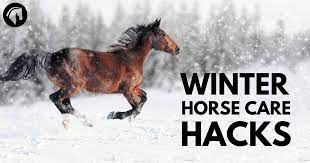Horse illnesses: The days are getting colder and shorter. Winter is around the corner, and so is the increased threat of a host of equine diseases. The danger persists irrespective of their vaccination status. Horses that have been traveling for shows and competitions in the summer have reduced immunity. As the fall inches closer, it is time for you to book an appointment with your veterinarian.
Keeping horses healthy and in racing shape is no magic.
Tech mistake | It takes a lot of hard work, dedication, and care. Horse keeping is a 24-hour job, and that is why there are specialists for grooming show horses, vets on the call for them,, and trainers to help them. Apart from the regular care, you give to your equine friend. You need to provide little extra care in the cold months since these times bring more pathogens and infections.
Here are a few things you need to do to provide optimum care to your horse –
Always be in touch with your vet
A performance horse requires regular performance and soundness checkups by the vet. If his or her vaccinations are due, visit your designated veterinary doctor at the earliest possible. Do not wait around for the weather to turn colder. Ask your vet about health tips, diet plans, and more to keep your horse safe this fall.
Vaccinations
All horses, even the ones you see in the Derby on TVG, require vaccines. For the last couple of years, West Nile Virus infections have become rampant in the US. In 2017, close to 377 horses caught the bug that renders the horses unable to compete or perform. Mosquitoes are the vectors of this disease that can be potentially deadly to humans as well. You should pay attention to their vaccination schedule. Ensure that they get their Eastern and Western Equine Encephalomyelitis (EEE/WEE) and WNV vaccines on time.
Deworm them
Deworming is just as essential as any vaccine for your horses. The colder days facilitate the transfer of parasites in the US. Some weathers are more effective than others for deworming. Speak with your vet for getting your horse on an effective deworming cycle. Your vet might recommend a fecal egg count test for determining the infestation level.
A few added precautions
No matter how well you protect them from the cold, and how carefully you vaccinate them each season, you will always have a slim chance of infections unless you follow these instructions –
- Minimize mouth-to-mouth and nose-to-nose contact with other horses.
- Do not share lead lines, water buckets, medication tubes, and halters between horses in the same stable.
-
Clean your stalls, and equipment daily.
- Sanitize your hand each time you complete grooming one horse and move to the next.
- Monitor the temperament of your horse closely. If you see anything that seems unusual, aggressive, or eccentric give your vet a call. Deviations from normal behavior might be a symptom of an infectious disease.
- Monitor them for a change in body temperature. Contact your vet if you see a sudden increase or decrease.
Taking care of a horse is never easy, but having some tips from experts always helps. This winter, give your friend all the protection he or she deserves with these easy-to-follow points of advice.
To get more knowledge about “Horse illnesses”, please visit our site: techmistake
